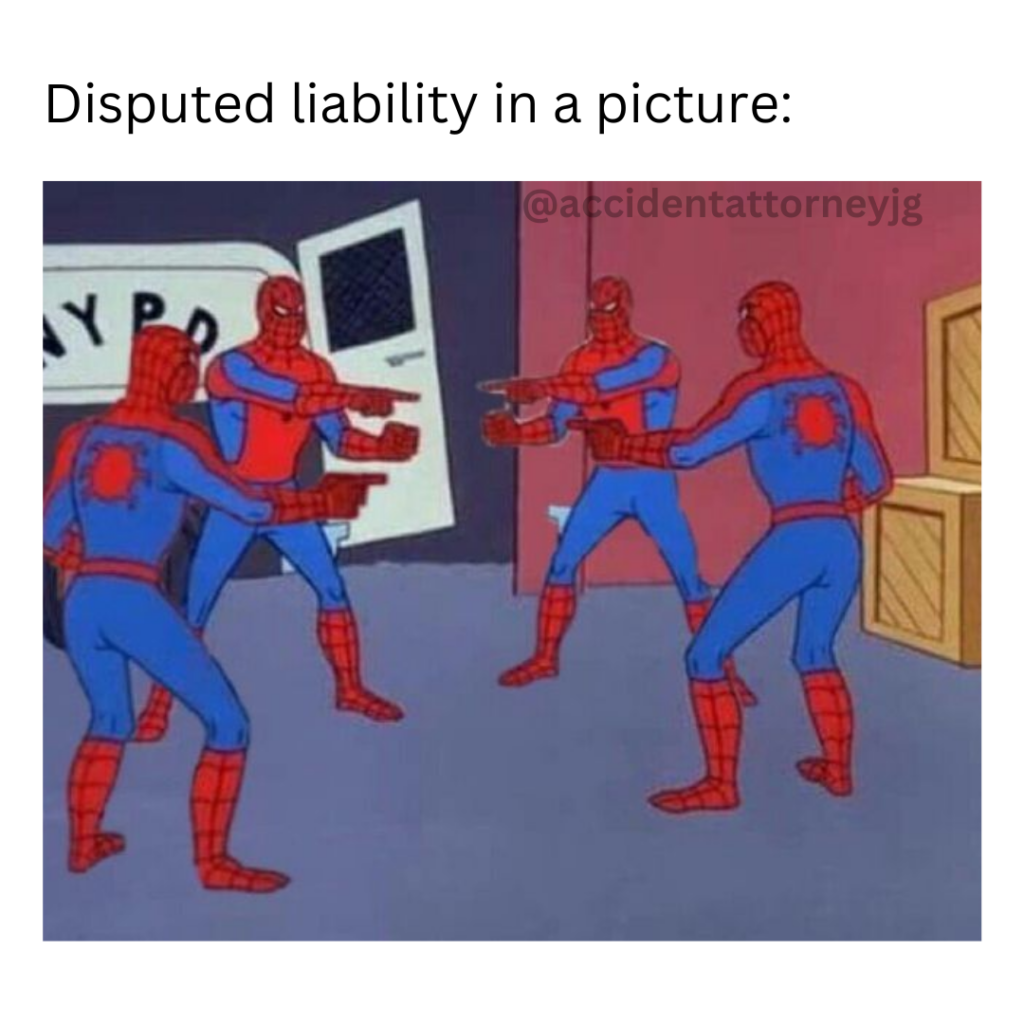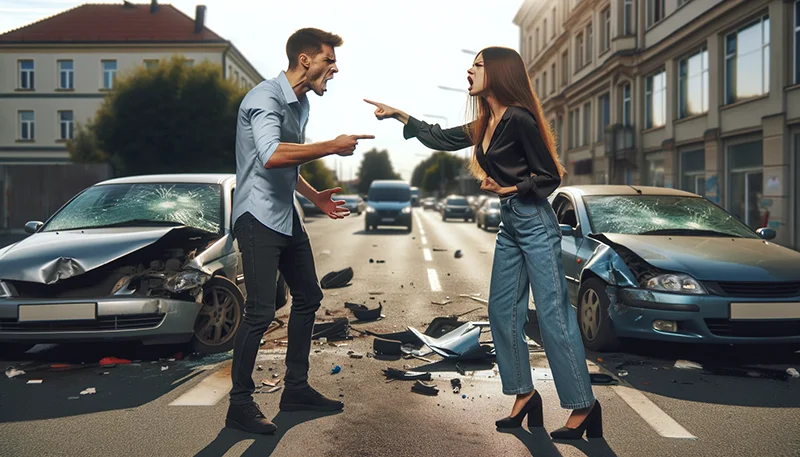After a car accident in Georgia, understanding your rights is vital, particularly when liability is contested. Insurance companies may dispute your claim, turning your life into a living nightmare. This especially true in car accident cases involving bodily injuries and other damages and losses. You could face traffic tickets, risking the forfeiture of your claims, and a possible rise in your auto insurance premiums.
A disputed liability car accident occurs when the drivers have conflicting accounts.

It’s a situation that may lead you to wonder, “Does liability insurance cover car damage?” The answer depends on whether there is clear evidence to support one side more than the other. Car accident attorneys play a crucial role in these situations, advocating for their clients and uncovering the truth. At Georgia Trial Attorneys, we empower our clients with knowledge and tools to strengthen their position in such disputes.
How to Dispute a Car Accident Fault
Disputing fault involves analyzing the accident scene, witness statements, surveillance footage, and police reports. Consulting a personal injury lawyer near me can significantly bolster your chances of a favorable outcome. Our team is adept in evidence collection, deposition, and negotiation.
Dealing with Accidents Where No Ticket is Issued
Clients often ask, “What if no ticket is issued in my car accident?” Proving fault can be more challenging in these circumstances, but not impossible. This underscores why obtaining a police report is crucial. Even if a police investigation seems unfavorable, reports, dash cameras, and body cameras can overturn an incorrect fault determination.
If you’ve received a citation after a car accident and believe you weren’t at fault, contest the citation. Do not pay the ticket as it is a per se admission that you were guilty. Such a plea effectively puts an end to any potential personal injury claim. Your options include getting the citation dismissed, entering a nolo contendere plea, or going to trial. Whatever you do, first consult with an experienced car crash lawyer.
Disputing Insurance Claims Against You
When disputing an auto insurance claim, it’s essential to take immediate action. Filing a personal injury claim and presenting evidence of the other driver’s negligence is crucial. Challenge the insurance company’s findings assertively, starting with a phone call and a follow-up letter. This letter should firmly dispute their fault finding, often prompting a further investigation.
At Georgia Trial Attorneys, we guide you in negotiating with insurance companies, ensuring your story is heard and considered. We support our clients at every step, from evidence gathering to challenging wrongful fault attributions.
What Evidence To Collect
Collecting the right evidence is key to proving the other driver’s fault. Here’s what to gather:
- Extent of Damage and Point of Impact: Take numerous photograph at different distances and angles of the damage to each vehicle. The location and severity of the impact can offer insights into how the accident occurred.
- Skid Marks on the Road: Look for and take pictures of any skid marks. They can provide valuable information about the speed and direction of the vehicles before the collision.
- Photographic Evidence of the Accident Scene: Capture multiple angles showing the street signs, landscape, lighting conditions, etc. after the accident. This helps reconstruct the event.
- Traffic Signs and Signals: Note any traffic signs or signals near the accident scene. Photograph them to demonstrate whether the at-fault driver may have ignored these traffic controls.
- Video Footage: Secure any available footage from traffic or surveillance cameras. This can be crucial in providing an unbiased account of the accident.
- Eyewitness Statements: Gather contact information and statements from people who witnessed the accident. Their observations can be pivotal in supporting your claim.
- Police Reports: Obtain a copy of the police report. It typically includes the officer’s assessment of the accident and can contain valuable information about fault and contributing factors.
- Accident Reconstruction Experts: In complex cases, the insights of accident reconstructionist may become invaluable. Their analysis can offer an objective perspective on the causation and fault, which can be pivotal in a disputed liability case.
- Your Statement: Finally, your personal account of the accident is vital. We encourage our clients to record their statements as soon as possible after the accident, to ensure accuracy and detail.
In collecting this evidence, it’s important to act promptly as conditions change, and memories fade. Our team at Georgia Trial Attorneys can guide you through this process, ensuring that all relevant evidence is gathered to support your claim effectively.
The Importance of DASH CAMERAS
We can’t stress enough the importance of dash cameras in personal injury cases, especially in a disputed liability circumstances. In an era where technology plays a crucial role, a dash camera can be your best ally in proving what really happened. They are a very cost-effective tool that provides an unbiased record of the incident that serves to corroborate other evidence.
What to Do After an Accident – To Protect Yourself:
After a car accident, your actions will significantly impact your possible claims. Here are key steps to follow after a car accident:
-
- Report to Insurance and Call the Police: Notify your insurance company about the collision as soon as possible. A police report is a crucial document that can influence court proceedings and insurance assessments.
- Document the Scene: Take clear, comprehensive photos of the accident scene. Capture details such as skid marks, accident debris, and the exact positions of the vehicles.
- Collect Witness Information: Gather names, phone numbers, and addresses of any witnesses. Their testimony can be vital in establishing the facts of the case.
- Exchange Information in Minor Accidents: If the accident is minor, exchange insurance details and license plate numbers with the other driver.
- Seek Medical Attention: For any injuries, seek medical care immediately. Delays in treatment can be used against you by insurance companies.
What NOT to Do After an Accident – To Protect Yourself:
At the same time, there are several things you should not do after a car crash:
-
- Avoid Admitting Liability: Never admit fault or make statements indicating responsibility for the accident.
- Don’t Sign Fault Statements: Avoid signing any documents or statements about who is at fault until you have spoken with your insurance company or a lawyer.
- Refrain from Making Payments: Do not offer or agree to pay for damages at the scene.
- Don’t Ignore Injuries: Even minor injuries should be checked by a medical professional. Document all medical care received.
- Decline Immediate Settlement Offers: Do not accept money or engage in settlement discussions with the other driver at the scene.
- Don’t Dismiss the Incident: Never agree to overlook the accident or injuries, no matter how minor they may seem.
Remember, the steps you take immediately following an accident are crucial in protecting your legal rights and ensuring a fair resolution.
The Necessity of a Personal Injury Attorney
After a car accident, especially withy disputed liability, a skilled personal injury attorney is an essential hire. Lawyers get noticed by insurance companies. They have expertise in law and negotiation skills. Without a lawyer, you risk being undervalued or exploited. .
Think You’re Not at Fault? We’re Here to Help
Do you believe the car accident wasn’t your fault? Don’t let insurance companies take advantage of you. Contact Georgia Trial Attorneys today. We’ll discuss your legal options and advocate for your best interests.

